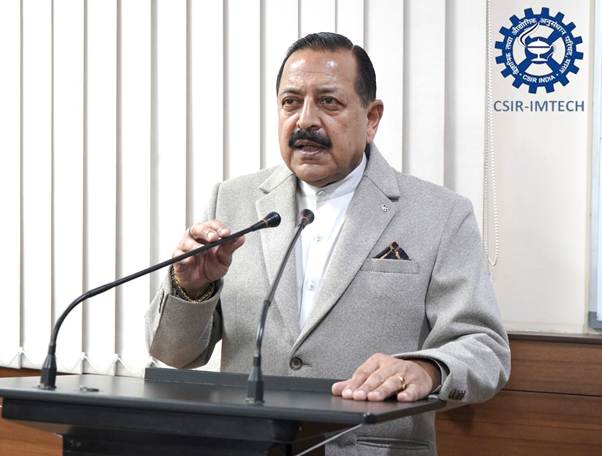Chandigarh: Union Minister of State (Independent Charge) for Science and Technology, Dr. Jitendra Singh, visited the CSIR-Institute of Microbial Technology (CSIR-IMTECH) in Chandigarh, where he inspected the Microbe Repository and reviewed the institute’s ongoing research projects. Emphasizing the crucial role of microbial technology in shaping the next phase of industrial innovation, he noted that this field has become a vital pillar of biotechnology, driving advancements in healthcare, agriculture, and environmental sciences.
During the visit, Dr. Singh praised Prime Minister Narendra Modi’s vision for the biotechnology sector, particularly through the introduction of the New BioE3 Policy, which focuses on biomanufacturing and bio foundries. He highlighted India’s remarkable progress in the biotech industry, noting that the country’s bioeconomy has grown from $10 billion in 2014 to over $130 billion in 2024, with projections to reach $300 billion by 2030. He also recalled the recent development of Nafithromycin, India’s first indigenous antibiotic designed to combat antibiotic-resistant infections, underscoring the nation’s ability to drive cutting-edge research in medicine.
CSIR-IMTECH, a leading research institute in microbial biotechnology, houses a national repository with over 14,000 microbial strains through its Microbial Type Culture Collection and Gene Bank (MTCC). The institute plays a crucial role in providing authenticated cultures for researchers and industries while supporting regulatory bodies such as IPC, BIS, and NBA. Dr. Singh commended the institute’s contributions to microbial genetics, infectious diseases, fermentation technology, and environmental microbiology, emphasizing the need for continued research and development in these areas.
Virtually connecting with the CSIR-Institute of Himalayan Bioresource Technology (CSIR-IHBT) in Palampur, Himachal Pradesh, Dr. Singh inaugurated several new scientific facilities and participated in discussions on sustainable agriculture and biotechnology. He addressed the EMBO Workshop on High Elevation Plant Adaptation in a Changing Climate (HEPACC) and the Industry, Farmer & Academia (IFA) Meet, highlighting the government’s efforts to integrate scientific research with economic development.
As part of his engagements, Dr. Singh also inaugurated a new tulip garden at CSIR-IHBT Palampur, commending the institute’s scientific advancements that have enabled tulip cultivation beyond its traditional season. He further launched products developed by agri-startups, reaffirming the government’s commitment to promoting innovation in the agricultural sector.
Discussing national initiatives, Dr. Singh acknowledged CSIR-IHBT’s leadership in multiple missions, including floriculture, aroma, millet, and precision agriculture. He noted that under the CSIR Floriculture Mission, floriculture has expanded to 1,000 hectares, benefiting thousands of farmers across states such as Himachal Pradesh, Punjab, Haryana, Uttarakhand, and Ladakh. He also inaugurated several new research and production facilities, including an autonomous greenhouse, a Heeng seed production center, and a phyto-analytical facility.
Addressing the broader implications of scientific innovation, Dr. Singh emphasized that by fostering collaboration between researchers, industry leaders, and government policymakers, India can harness its rich biodiversity for economic growth. He reiterated that continued investment in microbial research, biotechnology, and sustainable agriculture will not only empower farmers but also strengthen India’s position as a global leader in science and technology.





